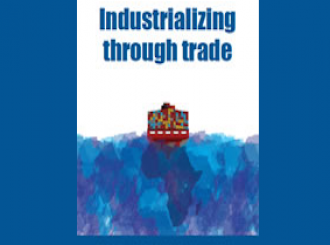
Addis Ababa, 6 October 2016 (ECA) - Africa’s growth continued to increase rising from 3.7 per cent in 2013 to 3.9 per cent in 2014. The performance was underpinned by improved macroeconomic management, diversified trade and investment ties with emerging economies among other factors. Africa’s social development indicators reveal the weakness of the observed economic performance: high unemployment and poverty coexisting with robust growth. This is a paradox.
Industrialization promises to address this paradox by promoting economic diversification, inclusive growth, efficient utilisation of abundant physical, mineral and human resources and in the process eliminate poverty and hence structurally transform Africa economies.
Trade continues to play a major role in Africa’s economic growth performance and it has potential to promote trade-induced industrialization of the continent provided it is deliberately directed at industrialization. For this purpose, trade policy must be consciously designed, effectively implemented and managed with regular monitoring and evaluation. Such a policy must recognise and tap into developments in the global production system especially internationalisation of production system with an objective to promote value addition through processing and manufacturing.
Finally, the goal of trade-induced industrialization must also guide the conduct, negotiations and implementation of trade and investment agreements and arrangements.
In order to provide interested stakeholders from government, business, civil society and academia with a better understanding of how trade can serve as an instrument of accelerated industrialization and structural transformation in Africa, the United Nations Economic Commission for Africa (ECA) together with its training arm, the United Nations Institute of Economic Development and Planning (UN-IDEP), has partnered with the United Nations Institute for Training and Research (UNITAR) to offer this e-learning course based on ECA’s Economic Report for Africa 2015 (ERA 2015).
At the end of the course, participants are expected to be able to: Discuss the recent main developments in the world economy and how they affect the African continent; Identify the main economic and social developments in Africa; Describe how trade can serve as an instrument of accelerated industrialization and structural transformation in Africa; Identify the challenges and opportunities for Africa to industrialize through trade in the context of rapidly changing regional and global economic environments; Better understand the effects of key trade agreements on Africa’s industrialization; Discuss the importance to properly sequence trade agreements in order to best support Africa’s industrialization efforts; and Discuss how African countries could address their major development challenges through mobilizing resources for structural transformation.
The course consists of five modules, each run for a week, and covering Recent Economic and Social Developments in Africa (ERA 2016); Trade and Industrialization: Theories and Experience; Repositioning Africa in Global Value Chains and Facilitating Trade in Intermediaries and Services; Getting Trade Agreements to Advance Africa’s Industrialization; And working towards a Selective Trade Policy Framework for Industrializing Africa.
The course commenced in earnest on the 26th of September 2016 and delivered 100% on-line in both English and French with moderators also providing learning support in two languages.
As a clear reflection of the relevance and interest generated by the publication, here are some interesting statistics that have so far arisen from this course in terms of applications and participation:
- Whereas there were only 250 places, equally split between the two languages, there were a total of 505 applications (340 for English and 165 for French);
- With regard to the accepted participants:
- 32% are women;
- 76% are representatives from government ministries with the rest drawn from academia, civil society and private sector;
- the age range of participants is 20 to 60 years;
- Representation from African countries: There are nationals of 35 countries taking the English course as compared to 24 countries for the French course.
A further update will be presented at the end of the course to reflect completion rates; Relevant and related feedback from the participants; The lessons learned; And the way forward on this and future eLearning courses on ECA’s flagship publications.
Issued by:
Communications Section
Economique Commission for Africa
PO Box 3001
Addis Ababa
Ethiopia
Tel: +251 11 551 5826
E-mail: ecainfo@uneca.org